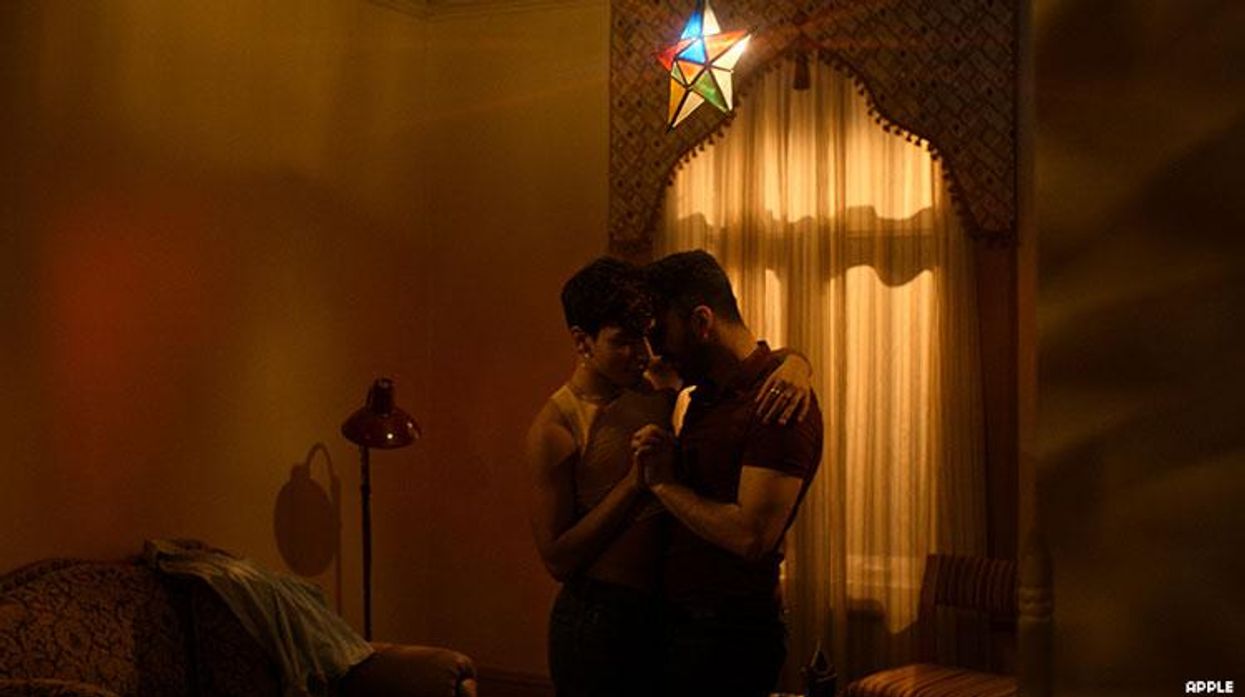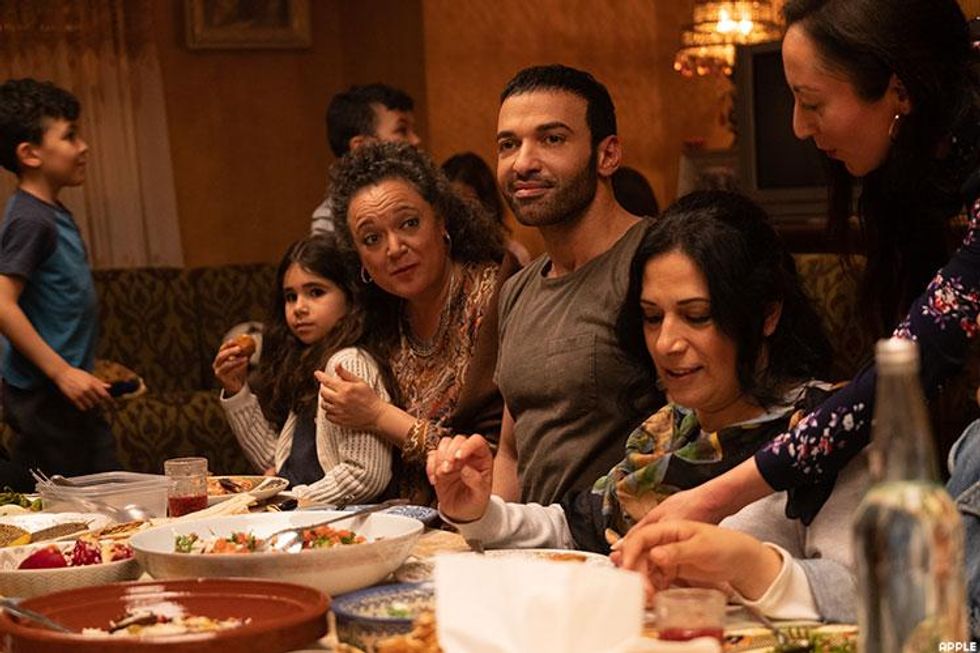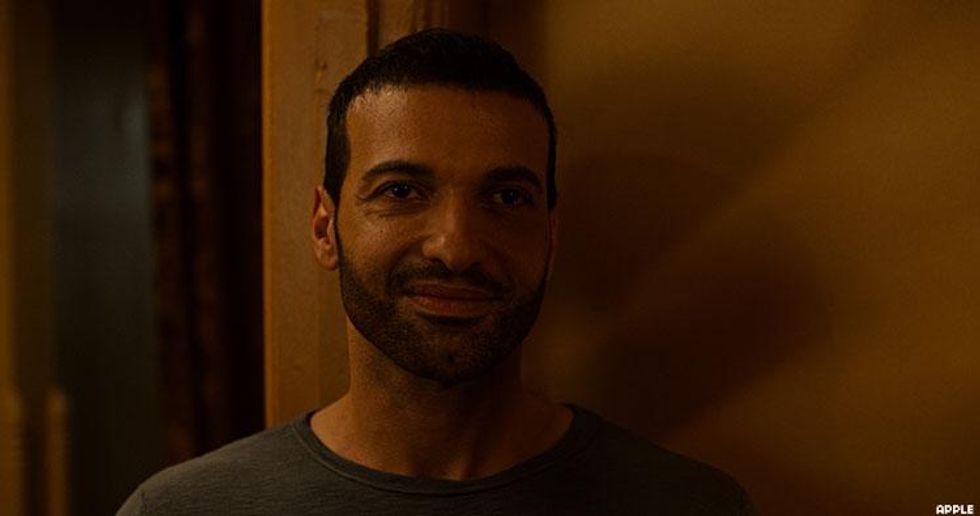In the opening scene of "The Son" -- an installment of the new Apple TV Plus anthology series Little America, from The Big Sick's Kumail Nanjiani and Emily V. Gordon -- Rafiq (Haaz Sleiman) is surrounded by the warmth of family members in his home in Syria. Inviting food is on the table. His brother announces his engagement to the delight of the room.
This warmth turns suddenly to searing pain when Rafiq's father catches him stealing a kiss from another man in the alley outside. The father scalds the flesh of his son's arm -- something he explains as an act of mercy. This is only a few seconds of pain, the Muslim man reasons to his son in agony. Imagine what an eternity of hell feels like.
"The Son" is scripted drama, but it is also based on the true story of Shadi Ismail, a gay man who fled Syria due to persecution, going first to Jordan and ultimately finding asylum in Boise, Idaho. His journey, like the other installments of Little America, was chronicled by Epic Magazine and adapted (in a 30-minute episode!) by writers Stephen Dunn and Amrou Al-Kadhi.
For Dunn, a Canadian-born writer known for the film Closet Monster and the upcoming Bravo reboot of Queer as Folk, Ismail's story may have originated from a Muslim family on a different continent, but it was also very personal. "I was also kicked out of my home when I was a teenager," Dunn, who also directed "The Son," told The Advocate. "Like so many other queer people, our lives are built around reimagining and rebuilding a sense of home and a sense of family."
Al-Kadhi, a nonbinary writer and drag performer whose new memoir Unicorn chronicles their journey from Iraq to the United Kingdom, has also faced family rejection. They know "the idea of someone on the run, looking for a place to belong."
"Stephen ... has had a tough time with his family. I'd had a very tough time with mine," Al-Kadhi said. This shared experience of seeking out people "who look after each other, even if they're not related to each other" made the pair decide to center Rafiq's story on the power of friendship -- as opposed to, say, the love story Ismail found later in life. Reality came to mirror fiction. "Indeed, we became great friends through the process," Al-Kadhi said of their relationship with Dunn.
 Rafiq (Haaz Sleiman) with family in Syria.
Rafiq (Haaz Sleiman) with family in Syria.
Rafiq discovers this found family in Zain (Adam Ali) -- a flamboyant coworker he meets while working in a restaurant in Damascus, the Syrian capital. He eventually befriends him, but not before confronting his own internalized stigma. Rafiq initially is repulsed by Zain's queer mannerisms, which he fears are a tell to those around them. Eventually, Rafiq embraces Zain as well as Zain's diva, Kelly Clarkson, the patron saint of the episode whose music inspires the men to find an escape from a society oppressive toward LGBTQ people.
The repeated mentions of the American Idol winner and her music throughout the episode serve multiple functions, according to its writers. "The projection of America goes so far beyond the borders of the country," Dunn said. "People all over the world, and especially in the Middle East, consume so much American content and media. It might be Madonna. It might be Kelly Clarkson. Or it might be Sally Field."
Clarkson is also representative of diva culture, in which queer people have found comfort and inspiration through strong women overcoming the odds. "For us it was Kelly because of the time period and also what she kind of stood for, which was the American dream of coming from obscurity and being highlighted on TV," Dunn said. "Also, the content of her lyrics, it all felt so palpably attainable for someone like Zain to be able to see this story and to be like, 'This is my queen, this is my idol.'"
Rafiq eventually is able to leave the Middle East after applying for asylum in the United States. This story, it should be noted, takes place in the recent past of the 2000s -- well before the election of Donald Trump, his travel ban, and the mass rejection of asylum seekers at the border.
Trump is never mentioned by name in "The Son" or any of the other episode of Little America. However, the shadow of his administration hovers over the stories, which take on new meaning as a result.
"Shadi is a real person who actually actually sought asylum and was granted asylum in the United States 10 years ago," Dunn said. "However, now if he was to seek refugee status here, that would be impossible."
The current political reality impacted "The Son." Dunn said the episode was almost never made due to the travel ban, which made it nearly impossible to authentically cast Arabic actors like Ali. Whereas the other episodes of Little America were shot in the U.S., "The Son" had to move its production to Montreal to finish filming. Thankfully, the move had the blessing of Nanjiani and Gordon.
In conversation, Dunn became emotional discussing how prejudice influenced -- and almost killed -- his production.
"I remain incredibly hopeful," Dunn said. "The pendulum does swing back and forth all the time politically. And it's so hard not to be pessimistic right now in the middle of such obscene xenophobia and racism that exists internationally and within America."

With all of this in mind, Dunn and Al-Kadhi were careful not to paint the Middle East in broad brushstrokes of homophobia while placing the United States on a pedestal. "We didn't want this episode to be 'Arab leaves scary brown land to come to the utopia of America.' We just wanted to celebrate Arab culture as well as critique some of the homophobia," Al-Kadhi said. Although the hope of the American dream is a major theme of "The Son," this dream is complicated upon Rafiq's arrival to the U.S.
First, Boise is a far cry from Hollywood, where he and Zain dreamed of escaping. Second, his first experience with the LGBTQ community is rejection; a bouncer at a gay club refuses to accept his asylum papers as a valid form of identification and bars his entry. Once he eventually walks in, the experience of flashing lights, pumping music, and yes, RuPaul's Drag Race's Chi Chi DeVayne lip-synching to Kelly Clarkson's "Breakaway" is momentarily overwhelming.
"It was important for us to show the immediate racial tension of not being allowed into the club and having to get out his immigration papers," Al-Kadhi said. "Because even though he's arrived and he's free ... I don't think it's going to be an easy life ... being a queer Muslim in America."
Like Rafiq, both Dunn and Al-Kadhi have experienced firsthand rejection from queer spaces that are ostensibly about acceptance. "Both of us are femme-presenting, queer people that haven't always felt comfortable even in our own spaces or the spaces that were intended to be for us," Dunn said. "And I think a queer and Arabic person going into a gay bar doesn't mean you're safe necessarily."
Al-Kadhi, who is based in the United Kingdom, knows that the gay community is not immune to the racism and xenophobia that are pervading the current political climate on either side of the pond.
"As a nonbinary person and as a drag queen, a lot of gay men don't want to sleep with me. They have inherent femmephobia because they've internalized ... shame," they said. "I've noticed racism increase in the gay community. Gays for Trump -- we have this similar movement in the U.K.: Gays Against Immigration and Gays Against Islam. These gays tend to be white affluent men who have a kind of social conservatism."
"The Son," with its international reach on Apple TV Plus, may be part of an antidote to that vitriol. The episode offers representation to queer Arabic people -- a group rarely seen in mainstream media. Both Dunn and Al-Kadhi hope their storytelling opens the doors to empathy and action.
"Our society is so divided and so afraid of one another," said Dunn, who has grown to appreciate the power of representation Hollywood is capable of. "I know it's just a TV show. But I do think that ... having these narratives accessible to people is an incredibly healing tool for us to try and understand each other."
Al-Kadhi added, "I hope that the realization that this character -- that hopefully you've come to love within half an hour -- would no longer be able to come to America and actually might have been killed, I hope that would encourage people into a sense of action to actually start holding government to account and change the way that they vote."
And for those in Syria or Canada or anywhere else in the world facing family rejection? Little America is for them too.
"And a lot of queer people who can't leave the Middle East, they do manage to set up their own kinds of family," Al-Kadhi said. "I think you see that in the episode with Zain and Rafiq really looking after each other. I think there's hope in that."
Every episode of Little America is now streaming on Apple TV Plus. Watch the trailer below.


 Rafiq (Haaz Sleiman) with family in Syria.
Rafiq (Haaz Sleiman) with family in Syria.


































































Charlie Kirk DID say stoning gay people was the 'perfect law' — and these other heinous quotes